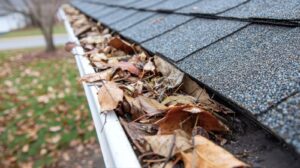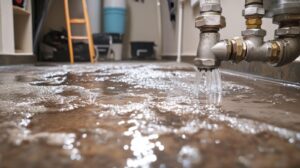Keeping your basement dry protects your home’s structural integrity and prevents problems like mold growth and poor indoor air quality. A dry basement contributes to a healthier living environment and preserves your property’s value.
However, effectively preventing water damage is often challenging, especially in areas susceptible to it.
Understanding the common causes of basement water damage is the first step toward effective prevention. By identifying and proactively addressing these risks, you greatly reduce the risk of water damage and ensure your basement remains dry and secure.
In the sections that follow, we’ll explore practical solutions and preventative measures you can implement to safeguard your basement against unwanted water.
Assessing your basement for risks
Conduct a thorough risk assessment to protect your basement from water damage. This involves identifying potential problem areas and understanding the benefits of professional inspections.
Identify problem areas
Start by examining your basement for signs of water damage or potential entry points for water. Look for water stains on walls and floors, peeling paint, or efflorescence — a white, powdery residue left by evaporated water.
Also, check for cracks or gaps in the foundation where water might seep in. Detecting musty odors is also essential, as they indicate hidden moisture issues even when no visible signs are present.
Professional inspection
While you may spot many issues on your own, enlisting a professional to assess your basement has several advantages. A professional can identify less obvious vulnerabilities, such as inadequate soil grading, poor drainage, or hidden cracks in the foundation.
They also tailor solutions based on the specific risks your basement faces, providing a strategic approach to waterproofing for long-term protection.
Combining your observations with a professional’s expertise allows you to create a comprehensive plan for keeping your basement dry and secure against water damage.
Exterior waterproofing solutions
To protect your basement effectively, start with these strategies that prevent water from reaching your foundation.
Proper gutter maintenance
Keep your gutters clean to ensure they effectively direct rainwater away from your foundation. Remove debris like leaves and twigs that block flow and cause overflow. Clean your gutters regularly, especially after heavy storms, to maintain proper water redirection. Extend downspouts at least five feet from the foundation to further prevent water from pooling near your home.
Improving landscape grading
The slope of your yard significantly influences how surface water flows. Ensure the ground slopes away from your foundation, ideally dropping six inches over ten feet. This gradient directs rainwater away from your basement walls.
If your yard doesn’t meet these criteria, consider regrading the soil around your home or incorporating sloped landscaping features to improve drainage.
Installing French drains
French drains provide a reliable method for managing subsurface water and protecting your basement’s integrity.
To install a French drain, dig a trench around your home’s perimeter, place a perforated pipe inside, and cover it with gravel. The gravel allows water to enter the pipe, which then channels it away from your home. This system is especially useful in areas prone to heavy rainfall or high groundwater levels, offering a solid line of defense against water damage.
Interior waterproofing measures
Effective interior waterproofing is essential to maintain a dry basement. Here are vital steps you can take to enhance the water resistance of your basement from the inside.
Sealants and coatings
Various waterproofing products are available to protect your basement walls and floors from moisture. Apply epoxy or polyurethane sealants to create a robust waterproof barrier over concrete surfaces. These sealants prevent water seepage through cracks and resist mold and mildew growth.
Additionally, waterproof masonry paints seal porous materials and provide a moisture-resistant finish.
Sump pumps and backwater valves
Install a sump pump to effectively manage water accumulation in your basement. A sump pump collects excess water in a basin and pumps it away from your home’s foundation.
Maintain your sump pump regularly by checking for debris in the basin, ensuring the pump remains upright, and testing it periodically to ensure it operates correctly.
Backwater valves prevent sewer backflow. These valves automatically close if sewage begins to back up into your home, preventing water and waste from entering your basement. Install a backwater valve, especially in areas prone to heavy rains and flooding, to protect your basement when municipal sewer systems become overwhelmed.
Foundation repairs
Maintaining the integrity of your basement starts with a solid foundation. Addressing any vulnerabilities in your foundation prevents water entry and subsequent damage. Here are effective methods for repairing and reinforcing your foundation.
Addressing cracks and gaps
Inspect your foundation regularly for any cracks or gaps that could allow water to seep in. Seal small cracks with hydraulic cement, which expands as it cures, creating a watertight seal.
For larger cracks, injectable polyurethane or epoxy resin seals and strengthens the affected area to prevent future cracking. To achieve the best adhesion and effectiveness, clean and prepare the crack surface properly before applying these materials.
External waterproofing membranes
Applying an external waterproof membrane is a proactive way to combat water seepage. These membranes, often made from polymer-modified asphalt, are applied directly to the exterior walls of the foundation. They create a continuous barrier that water cannot penetrate, effectively keeping your basement dry.
Installation typically requires excavating around the foundation to expose the walls, allowing for thorough coverage and sealing of all potential water entry points. This method provides one of the most reliable defenses against water seepage, protecting your home for years to come.
Lifestyle and maintenance tips
Maintaining a dry basement requires regular attention and proactive measures. Here are some effective lifestyle and maintenance tips to help keep your basement in top condition.
Regular inspections
Create a schedule to regularly check key areas that affect your basement’s dryness. Inspect your gutters and downspouts monthly to ensure they are free from debris and effectively channel water away from your foundation.
Seasonally check the landscape grading to ensure it continues to slope away from your home, which helps prevent water accumulation near your foundation.
Also, regularly examine your basement walls and floor for any new signs of moisture or cracks.
Monitoring humidity levels
Keep humidity levels in your basement optimal to prevent mold growth and protect your home’s structural integrity. A hygrometer should be used to monitor humidity regularly, with the aim of keeping it between 30% and 50%.
If humidity consistently exceeds this range, use a dehumidifier to reduce moisture in the air. Ensure your basement has good ventilation to aid air circulation and control humidity. Sealing windows and doors can also prevent outside moisture from seeping into the basement.

Prevent water damage and protect your home with Black Diamond Water Damage & Disaster Restoration
For expert assistance, contact Black Diamond Water Damage & Disaster Restoration. Our experienced team addresses all aspects of basement waterproofing and water damage restoration, ensuring your home is protected against current water issues and prepared for future challenges.
Trust Black Diamond to provide reliable, effective solutions that keep your basement dry and secure year-round.
daftar situs gacor situs slot slot online situs slot togel resmi situs toto situs toto monperatoto kampungbet keluaran hk situs slot toto slot slot gacor kampungbet data macau rtp slot situs toto kampungbet situs hk bento4d toto slot slot terpercaya toto slot toto slot toto slot toto slot slot gacor toto slot toto slot link slot gacor situs slot gacor situs toto toto slot toto togel bento4d






